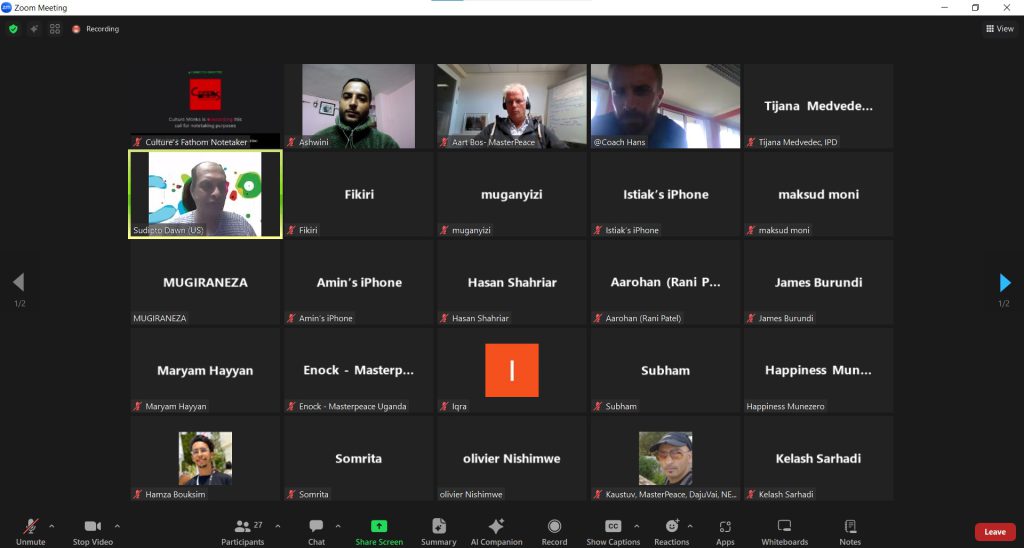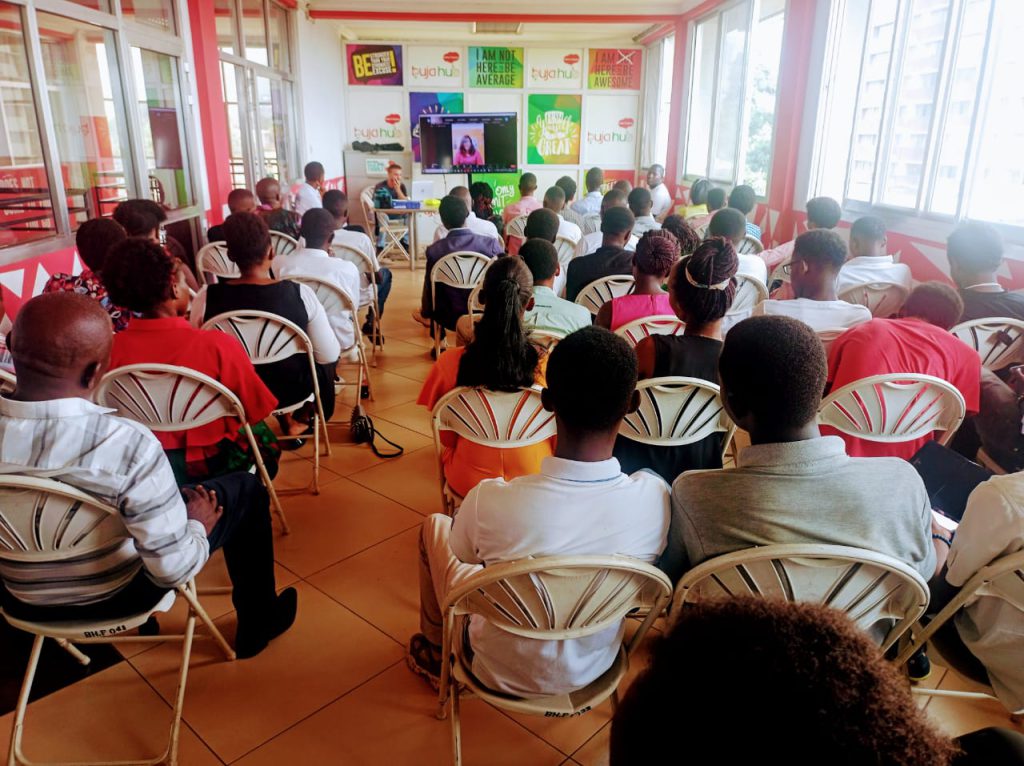Upcoming COOL Talks
Every Month, we will have insightful, concise and powerful dialogues on the various topic under SDGs as a COOL Talk by bringing and connecting experts, dedicated grassroot level actors, youths and other stakeholders. For more details on the topic of the Talk, Date and Link to join, slide to next:
MasterPeace Launched the COOLeaders initiatives on the occasion of World Environment Day June 5, 2023. The MasterPeace COOLeaders program is building leadership at grass roots level, particularly in the youth for climate action and social transformation. Along with our clubs and partners throughout the world we are reaching out to more and more people and motivating them to take some practical actions which can make a major difference for this planet. Since its launch, the reactions from MasterPeace clubs, their communities, our global network and other stakeholders have been very positive and regard it as a “timely” and “relevant” program. The COOL Talk is one of the interventions of COOLeaders. We believe that dialogue is the best way to find any solution because it brings a different perspective to the table from a diverse audience which then contributes in building strategy and policy. So far, we have organized 4 amazing COOL Talks in Burundi, Uganda, Sri-Lanka and Kenya. As the details of the Burundi program was already published, here we present about other 3 COOL Talks.
COOL Birds and COOLeaders of Uganda
Masterpeace Uganda & Masterpeace Global has launched a project called “COOL Birds and COOLeaders of Uganda on August 30, 2023 with a COOLtalk with speakers from eco – tourism and birding community in Uganda as well as from Harvard university interacting with the audience.
This project addresses the problem of diminishing biodiversity cover and the bird population of Uganda. The project mission is to increase awareness and engage the people of Uganda, especially the children and youth about the rich biodiversity and culture of Uganda and motivate them to take practical actions to create the right environment for the protection of bird species and the indigenous culture. Masterpeace Uganda will be organizing several public events like workshops, seminars, performances, public art projects and also conducting bird watching trips in order to fulfill the project objectives. The project also works towards promoting sustainable tourism practices by involving the bird watching, cultural organization and the tourism industry in a discourse to protect biodiversity.
The project has won the award from The African Social Fund and this will further strengthen the project activities in 2024.
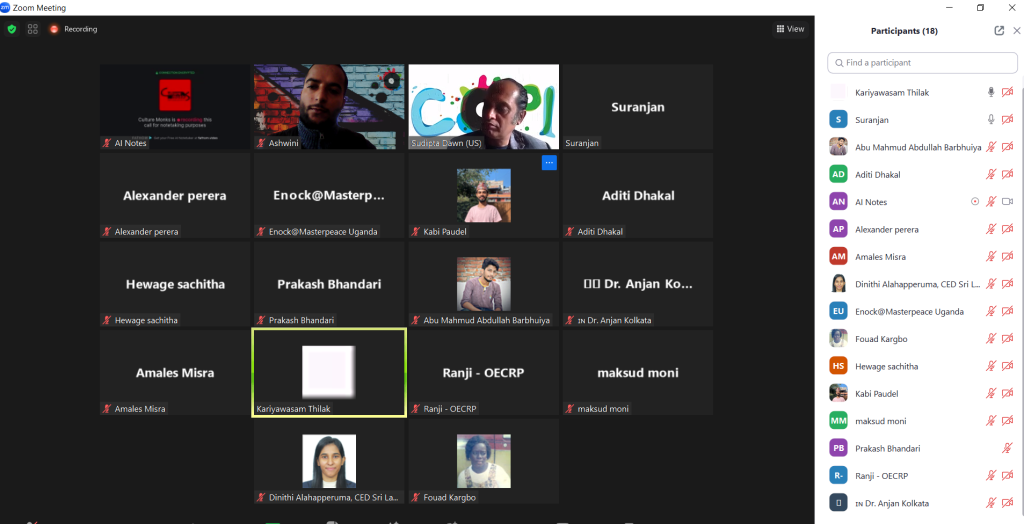
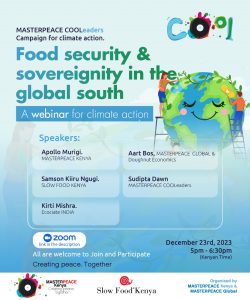
Impact of climate change on development in Sri Lanka and potential solutions.
Sri Lanka COOL Talk is the first one from Asia in the MasterPeace Cool Talks series. Thanks to lead from MasterPeace Sri Lanka, more than 20 participants engaged in insightful conversation with experts from Sri Lankan public and private forums.
Sri Lanka is facing economic challenges and the impact of climate change, seeking climate financing and carbon credits. There’s a notable absence of climate education at the grassroots level, emphasizing the necessity for improved communication channels. Recognizing the significance of climate justice, efforts are aimed at ensuring that the benefits of initiatives directly reach affected communities. Civil society groups are seen as key players in facilitating projects that bridge carbon markets with on-the-ground practices. Following a COOL Talk, it was agreed upon to engage in further deliberations to formulate projects addressing the key issues raised.
From the speakers Mr. Suranjan Kodithuwakku, CEO of Green Movement of Sri Lanka (GMSL) and Mr. Thilak Kariyawasam, President,Lanka Organic Agriculture Movement (LOAM) stressed on the fact that the process distribution of aid to the grassroots level to the most affected poor people is very inefficient and this needs to be addressed. They also stressed that they have raised this issue at the related forum at COP 28 summit and have tried to raise grants to address the severe challenges faced by the farming and fishing communities due to climate change events.
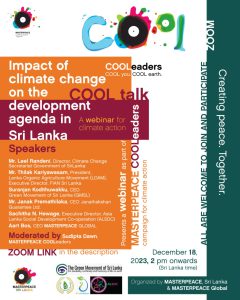
COOLtalk Kenya titled food security to food sovereignty in the Global South.
Food security is a major challenge in the Global South, with issues like malnutrition, lack of access to nutritious and diverse foods, reliance on industrial/processed foods, etc. The need for immediate action from various levels is evident- from addressing basic hunger to building local food systems and markets to participating in global value chains sustainably.Agroecology and empowering smallholder farmers with knowledge and inputs is key to building resilient local food systems and food sovereignty.
Organizations like Slow Food Kenya are promoting food sovereignty through initiatives like community gardens, farmers markets, education programs, etc. On Dec 23, MasterPeace and MasterPeace Kenta jointly hosted a COOL Talk on the topic Food security to Food sovereignty in the Global South.
Our guest speaker – Mr Amalesh Misra from Bengal who is a Chief Functionary at Paribesh Unnayan Samity , introduced his organization and work called folk school, which is mobilizing village children through indigenous sports and games and introducing them to indigenous seeds varieties and farming methods. He has invited Masterpeace to be part of the annual general meeting to discuss ways in which we can support this initiative. Mr. Kirti Mishra, Co-founder & Director, shared an overview of the key challenges and the strategies to counter the problem of food security and sovereignty.
Mr. Samson from Slow Food Kenya shared a brief of the various activities of his organization and also answered questions about the reception of these interventions in Kenya. He shared that the work of Slow Food Kenya had gone off to a slow start with much skepticism. However, the issue of healthy slow food as opposed to fast food has become more pertinent today and hence there is more acceptance and uptake now.
Apollo from MasterPeace Kenya shared a brief about the various challenges facing Kenya – both in the rural and urban area, which is leading to undernutrition and overnutrition respectively.
With these COOL Talks and upcoming, it is essential to transform dialogue into actions. As MasterPeace’s more than a decade work is also based on co-creation amongst the stakeholders to scale up grassroot level issues and initiatives. Eventually, the communities should benefit massively from this bottom-to-top approach. Thus, MasterPeace will keep facilitating in co-creating projects and campaigns which will be launched in 2024 to address the discussed issues. It was agreed that we will all be working in the future to explore ways in which we address the problem through collaboration.
Artivism, Gender & Sports : Women’s Participation in Public Spaces: Importance and Challenges
The COOL talk took place on March 15 where 50+ participants were present in hybrid mode. As organized by MasterPeace Burundi with support from MasterPeace and Play International, the talk was mainly using Sports as a Artivism tool to empower women , address their challenges and possible opportunities for co-creation. Experts in such field delivered best practises and new idea to bring such topic forward.
Fikiri emphasized the importance of women’s participation in sports and other activities in public spaces, highlighting the benefits it can bring such as increased confidence, self-esteem, and potential financial benefits through professional sports. He noted the importance of encouraging women’s participation, particularly in areas like Burundi where the numbers are low, even with efforts to engage women. Despite this, Fikiri pointed out some positive trends, such as increasing involvement of women in community organizations and village savings and loans associations. The importance of women’s participation in decision-making and sports activities were underscored . He introduced speakers from various countries, including Aart Bos, a global leader from the Netherlands, Somrita Urni Ganguly, a university professor from India, Hans Assisa, a business coach from BUJA Hub and Stephan Menard from Play International.
Sudipto, from MasterPeace COOLeader then welcomed everyone and emphasized the purpose of the gathering, which was to broaden understanding, stimulate further research, and inspire action. Sudipto and Istiak Ahmed, MP Bangladesh Leader, conversation focused on the challenges women face in participating in sports and other public activities, particularly in less developed countries. The discussion furthers around the progress made in professional women’s sports and the increasing number of women involved in fitness activities. However, they noted that these advancements are not reflected in rural areas or in the digital space, where violence and aggressiveness often discourage women’s participation.
Soccer for Social Change and Youth Empowerment
Sudipto emphasized the need to create more physical, mental, and digital spaces where women can participate in public activities, including sports, to create a more balanced and less toxic society. Soccer for Social Change and Youth Empowerment All the speakers spent some time in discussion about using sports, particularly soccer, as a tool for social change and personal empowerment, especially for youth. Aart emphasized the role of soccer in uniting and empowering individuals, and suggested the potential for collaboration with organizations like UEFA and FIFA to secure resources.
Empowering Youth Through Innovation and Entrepreneurship
The coach highlighted the significance of empowering young people, particularly through initiatives like Baju hub, a tech hub that promotes innovation and entrepreneurship. The coach emphasized that Baju hub has been instrumental in training thousands of young people and promoting over 100 companies since 2019. The coach also underscored the necessity for young people to understand the importance of teamwork and personal development, particularly in Burundi’s post-war society. The coach stressed the impact of entrepreneurship in fostering peace and creating job opportunities. The coach also mentioned the importance of equipping young people with the right mindset and initiatives to contribute to a better control and stability in the country.
